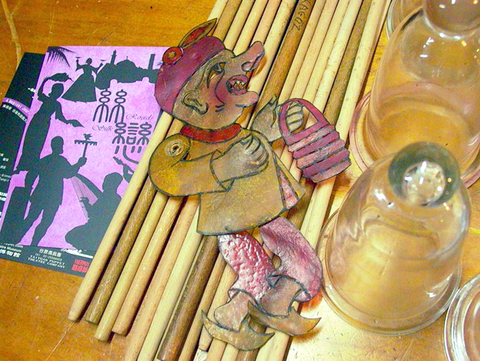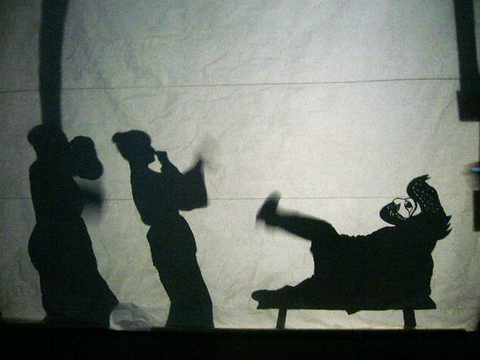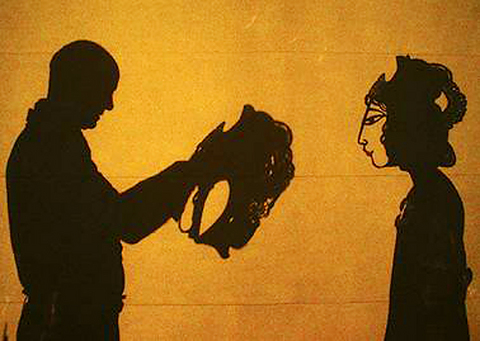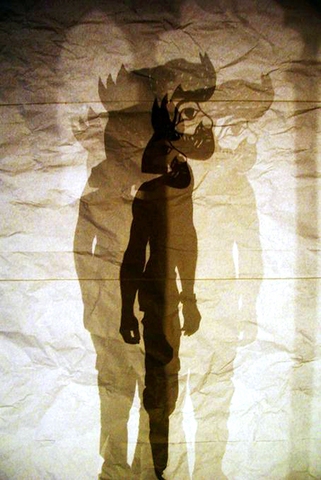At a small theater on Taipei's west side, Taiwan's foremost puppeteer Chen Xi-huang (陳錫煌) adds a few finishing touches to his glove puppets while the Turkish shadow puppet master Cengiz Ozek discusses how to present the show with stagehands and Robin Ruizendaal, art director of Taiyuan Puppet Theater Company (台原偶戲團).
Fittingly, the international collaboration is about an adventure on the silk road, the ancient cultural highway linking Asia and Europe, as artists and musicians from Taiwan, Turkey and the US contribute their inspiration to the interdisciplinary production combining Taiwan's glove puppet and Turkish shadow puppet theaters, live performances and large shadow screen performances directed by Larry Reed, founder of the Shadowlights Company of San Francisco. (see story below.)
Silk Road (絲戀) tells of the story of two sisters traveling through the silk road from China to Istanbul to find a magical harp that charms silkworms to produce the most beautiful colored silk in the world. From mountain, desert to oasis and spice fair, the girls encounter all kinds of exotic animals, magicians, human traffickers, belly dancers, poets, sages and hobgoblins on their journey.

PHOTOS COURTESY OF TAIYUAN PUPPET THEATER COMPANY
To Ruizendaal and Ozek, the show is a theatrical celebration and exploration of the ancient cultural exchanges that have left an indelible imprint on today's world. "One of my key interests for the play is to see the shared affinity of puppetry traditions in China, Turkey, Egypt and Taiwan," said Ozek, art director of Istanbul International Puppet Festival.
A unique and innovative experiment, the production is presented on three stages, one designed for actors, the other two for glove and shadow puppetry. Reed builds on this with his light show, that creates a world of amazing shadows, overlapping images and the illusion of depth.
As for the music, Taiwan's award-winning composer Li Che-i (李哲藝) will team up with Turkish musicians Binnaz Celik and Gunay Celik to stage live performances of the original score mixing Turkish folk songs and traditional Chinese music.

"Our biggest challenge is to integrate all the diverse elements into one coherent play," said Ruizendaal, adding that the production is a first-time attempt to every one involved.
Also new is the ensemble's attempt to offer a lively introduction to the ancient theatrical tradition in Turkey, its exquisite marionettes made out of camel skin and the beloved puppet figure Karagoz, a playful jester who undergoes different transformations in different stories that come from the grassroots culture as a manifestation of the people's voices, ideas and lives.
Having studied shadow puppet theater since age 11 and played Karagoz for the past 30 years, Ozek is excited to bring life to his favorite character not only through his accomplished puppetry art but as a real human performance on the stage. "I always feel myself as Karagoz. In the shadow puppet theater, I am connected with Karagoz with two sticks, but now for the first time, I am Karagoz," said Ozek, who will bring this creative production to Istanbul International Puppet Festival in May.



In the March 9 edition of the Taipei Times a piece by Ninon Godefroy ran with the headine “The quiet, gentle rhythm of Taiwan.” It started with the line “Taiwan is a small, humble place. There is no Eiffel Tower, no pyramids — no singular attraction that draws the world’s attention.” I laughed out loud at that. This was out of no disrespect for the author or the piece, which made some interesting analogies and good points about how both Din Tai Fung’s and Taiwan Semiconductor Manufacturing Co’s (TSMC, 台積電) meticulous attention to detail and quality are not quite up to

April 21 to April 27 Hsieh Er’s (謝娥) political fortunes were rising fast after she got out of jail and joined the Chinese Nationalist Party (KMT) in December 1945. Not only did she hold key positions in various committees, she was elected the only woman on the Taipei City Council and headed to Nanjing in 1946 as the sole Taiwanese female representative to the National Constituent Assembly. With the support of first lady Soong May-ling (宋美齡), she started the Taipei Women’s Association and Taiwan Provincial Women’s Association, where she

Chinese Nationalist Party (KMT) Chairman Eric Chu (朱立倫) hatched a bold plan to charge forward and seize the initiative when he held a protest in front of the Taipei City Prosecutors’ Office. Though risky, because illegal, its success would help tackle at least six problems facing both himself and the KMT. What he did not see coming was Taipei Mayor Chiang Wan-an (將萬安) tripping him up out of the gate. In spite of Chu being the most consequential and successful KMT chairman since the early 2010s — arguably saving the party from financial ruin and restoring its electoral viability —

It is one of the more remarkable facts of Taiwan history that it was never occupied or claimed by any of the numerous kingdoms of southern China — Han or otherwise — that lay just across the water from it. None of their brilliant ministers ever discovered that Taiwan was a “core interest” of the state whose annexation was “inevitable.” As Paul Kua notes in an excellent monograph laying out how the Portuguese gave Taiwan the name “Formosa,” the first Europeans to express an interest in occupying Taiwan were the Spanish. Tonio Andrade in his seminal work, How Taiwan Became Chinese,